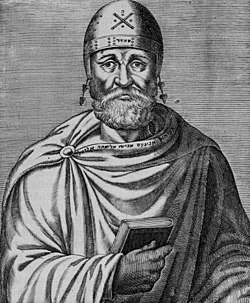Philo of Alexandria Quote
Related Quotes
I want to think about trees. Trees have a curious relationship to the subject of the present moment. There are many created things in the universe that outlive us, that outlive the sun, even, but I ca...
Annie Dillard
Tags:
beauty, belief, consciousness, creation, curiosity, disbelief, energy, enoughness, epiphany, exploration
People will say,"there's heaven and hell", and they take it so serious that they look so sorrowful with penitence. I would rather ask them to show me the route that leads to heaven or hell.
Michael Bassey Johnson
Tags:
argument, atheism, atheist, curiosity, curious, disbelieve, doubt, doubting mind, doubting thomas, dream
About Philo of Alexandria
Philo of Alexandria (; Ancient Greek: Φίλων, romanized: Phílōn; Hebrew: יְדִידְיָה, romanized: Yəḏīḏyāh; c. 20 BCE – c. 50 CE), also called Philō Judæus, was a Hellenistic Jewish philosopher who lived in Alexandria, in the Roman province of Egypt.
The only event in Philo's life that can be decisively dated is his representation of the Alexandrian Jews in a delegation to the Roman emperor Caligula in 40 CE following civil strife between the Jewish and Greek communities of Alexandria.
Philo was a leading writer of the Hellenistic Jewish community in Alexandria, Egypt. He wrote expansively in Koine Greek on philosophy, politics, and religion in his time; specifically, he explored the connections between Greek Platonic philosophy and late Second Temple Judaism. For example, he maintained that the Greek-language Septuagint and the Jewish law still being developed by the rabbis of the period together serve as a blueprint for the pursuit of individual enlightenment.
Philo's deployment of allegory to harmonize Jewish scripture, mainly the Torah, with Greek philosophy was the first documented of its kind, and thereby often misunderstood. Many critics of Philo assumed his allegorical perspective would lend credibility to the notion of legend over historicity. Philo often advocated a literal understanding of the Torah and the historicity of such described events, while at other times favoring allegorical readings.
The only event in Philo's life that can be decisively dated is his representation of the Alexandrian Jews in a delegation to the Roman emperor Caligula in 40 CE following civil strife between the Jewish and Greek communities of Alexandria.
Philo was a leading writer of the Hellenistic Jewish community in Alexandria, Egypt. He wrote expansively in Koine Greek on philosophy, politics, and religion in his time; specifically, he explored the connections between Greek Platonic philosophy and late Second Temple Judaism. For example, he maintained that the Greek-language Septuagint and the Jewish law still being developed by the rabbis of the period together serve as a blueprint for the pursuit of individual enlightenment.
Philo's deployment of allegory to harmonize Jewish scripture, mainly the Torah, with Greek philosophy was the first documented of its kind, and thereby often misunderstood. Many critics of Philo assumed his allegorical perspective would lend credibility to the notion of legend over historicity. Philo often advocated a literal understanding of the Torah and the historicity of such described events, while at other times favoring allegorical readings.
